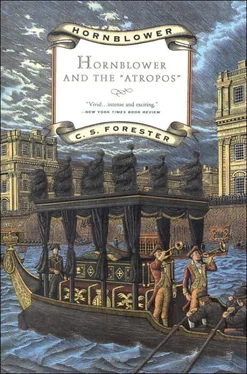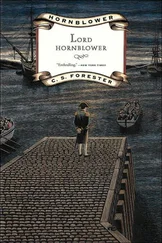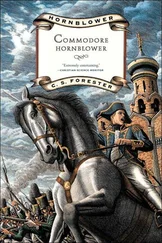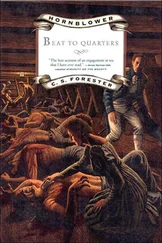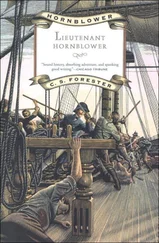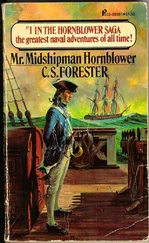“Not nearly as much as if you had been with me, dear,” said Maria, but gratified beyond all measure. She darted glances at the other women in the cabin to detect the envy they must feel on account of her having such a wonderful husband.
“The boy was good?” asked Hornblower. “He ate his pap?”
“Every bit of it,” answered Maria proudly, looking down at the sleeping child. “He was inclined to whimper at times, but now he is sleeping happily.”
“If it had been two years from now that we made this journey,” said Hornblower, “how interested he would have been! He would have helped with the lines, and I could have taught him to hold the tiller.”
Now he was not being hypocritical at all.
“He showed a lively interest even now,” said Maria.
“And what about his little sister?” asked Hornblower. “Did she behave well?”
“Horatio!” said Maria, a little scandalized.
“I hope not badly, dear,” said Hornblower, smiling away her embarrassment.
“No, excellently,” admitted Maria.
They were gliding into a lock; Hornblower heard the rattle of the paddles being let down behind them.
“You made very little progress with your sausages, dear,” he said. “Let me dispose of them while you tackle some of this bread and meat, which is really delicious.”
“But, dear—”
“I insist.”
He took Maria’s platter and his own, and stepped out into the bows of the boat in the darkness. It was the work of a moment to give the platters a quick rinse overside; the work of another moment to drop overside the sausage from his pocket, and he returned with the dripping platters to a Maria both scandalized and delighted at the condescension of her husband in thus doing menial work.
“Too dark to enjoy any scenery,” he said—already the boat was moving out of the lock—“Maria, my dear, when you have completed your supper I will endeavour to make you as comfortable as is possible for the night.”
He bent over the sleeping child while Maria repacked the remains of the supper.
“Now, my dear.”
“Horatio, really you should not. Horatio, please, I beg of you—”
“No need for a hat at this time of night. Let’s have it off. Now there’s plenty of room for you on the bench. Put your feet up here. No need for shoes either. Not a word, now. Now a pillow for your head. The bag will make a good foundation. Comfortable like that? Now, the coat over you to keep you warm. There, now sleep well, my dear.”
Maria was carried away by his masterful attentions so that she could not protest. She had lain still for a full two minutes before she opened her eyes again to ask what he was doing for his own comfort.
“I shall be supremely comfortable, my dear. I’m an old campaigner. Now close those eyes again, and sleep in peace, my dear.”
Hornblower was by no means supremely comfortable, although he had often spent worse nights, in open boats, for instance. With Maria and the child lying on the thinlycushioned bench he had necessarily to sit upright, as the other passengers were doing. What with the lamp and the breathing of all those people in the cramped little cabin the air was stuffy; his legs were cramped, the small of his back ached, and the part on which he sat protested against bearing his weight unrelieved. But it was only one night to live through, after all. He crammed his hands into his pockets and settled himself again, while the boat went on down the river through the dark, stopping at intervals at the locks, bumping gently against the walls, gliding forward again. He knew nothing, naturally, of the river between Oxford and London, so he could not guess where they were at any time. But they were heading downstream and towards his new command.
Luckily he was to have a command, he told himself. Not a frigate, but a sloop so big—twentytwo guns—as to justify having a captain and not a commander. It was the best that could be hoped for, for the man who a month ago was the six hundred and first captain out of the six hundred and two on the list. Apparently Caldecott, the previous captain of the Atropos , had broken down in health while fitting her out at Deptford, which accounted for his unexpected summons thither to replace him. And the orders had no sooner reached him than the news of Nelson’s victory at Trafalgar had arrived in England. Since that time no one had had a thought save for Nelson and Trafalgar. The country was wild with delight at the destruction of Villeneuve’s fleet, and in the depths of sorrow at Nelson’s death. Nelson—Trafalgar—Nelson—Trafalgar—no column in a newspaper, no momentary gossip with a stranger, but contained those names. The country had been lavish with its rewards. A state funeral was promised for Nelson; for the Navy there were peerages and knighthoods and promotions. With the re-creation of the rank of Admiral of the Red twenty new admirals had been promoted from the top of the captains’ list; two captains had fallen at Trafalgar, and two more had died; so that Hornblower was now the five hundred and seventyseventh captain in seniority. But at the same time promotion had been lavish among the commanders and lieutenants. There were fortyone new captains on the list—there was something gratifying in the thought that now he was senior to fortytwo captains. But it meant that now there were six hundred and nineteen captains seeking employment, and even in the vast Royal Navy there were not enough vacancies for all those. A hundred at least—more likely a hundred and fifty would be on halfpay awaiting employment. That was as it should be, one might think. That proportion not only made allowance for sickness and old age among the captains, but also made it unnecessary to employ chose who had been proved to be inefficient.
Unless the inefficient had friends in high places; then it would be the friendless and the unfortunate who languished on halfpay. Hornblower knew himself to be friendless, and even though he had just been congratulating himself on his good fortune he always thought himself ultimately doomed to misfortune. He was on his way to take over a ship that someone else had fitted out with officers and men he knew nothing of; those facts were sufficient basis on which his gloomy pessimism could build itself.
Maria sighed and turned herself on the bench; Hornblower crept down to her to rearrange the heavy coat over her body.
At Brentford, in the early light of the winter’s morning, it was cold and damp and gloomy. Little Horatio whimpered ceaselessly; Maria was uncomfortable and weary, as she stood beside Hornblower while her trunk and Hornblower’s two sea chests were being hoisted out of the boat.
“Is it far to Deptford, my dear?” she asked.
“Far enough,” said Hornblower; between Brentford and Deptford lay the whole extent of London and much more beside, while the river on which they were to travel wound sinuously in wide curves, backwards and forwards. And they had arrived late, and the tide would barely serve.
The wherrymen were soliciting for his custom.
“Boat, sir? Sculls, sir? Oars, sir?”
“Oars,” said Hornblower.
It cost twice as much for a wherry rowed by two oarsmen as for one rowed by a single man with sculls, but with the ebbing tide it was worth it. Hornblower helped Maria and the baby down into the sternsheets and looked on while the baggage was handed down.
“Right, Bill. Give way,” said strokeoar, and the wherry shot away from the slip out on to the grey river.
“Ooh,” said Maria, a little afraid.
The oars ground in the rowlocks, the boat danced on the choppy water.
“They say the old King’s fair mazed, sir, at Lord Nelson’s death,” said stroke, with a jerk of his hand towards Kew, across the river. “That’s where he lives, sir. In the Palace there.”
Читать дальше
